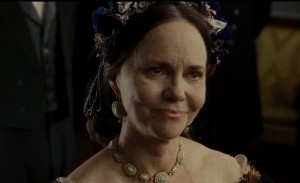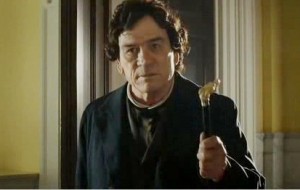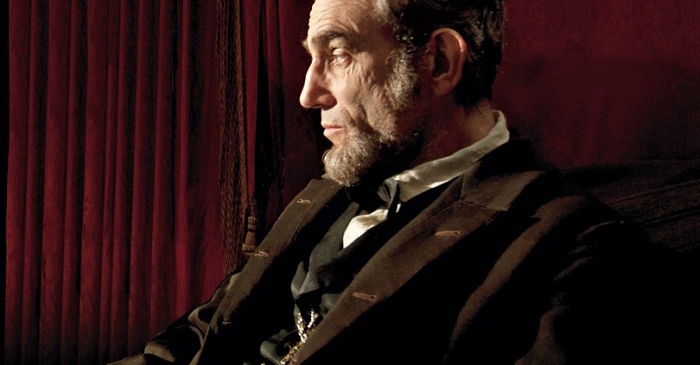Fuse Movie Review: “Lincoln” — Ken Burns Does It Better
As Lincoln’s end credits roll, you feel vaguely dissatisfied and disappointed that the film never achieves the emotional greatness that it might have in the hands of a different director.
Lincoln. Directed by Steven Spielberg. At cinemas throughout New England.
By Glenn Rifkin.
One thing is evident as you exit the theater after watching Steven Spielberg’s epic Lincoln: Ken Burns does this history stuff far better. That’s not to say Lincoln isn’t a decent historical bio-pic with an outstanding performance by Daniel Day-Lewis as the nation’s tragic, transcendent sixteenth president. But as the end credits roll, you feel vaguely dissatisfied and disappointed that the film never achieves the emotional greatness that it might have in the hands of a different director.
Spielberg has been the undisputed king of Hollywood, a first-ballot Hall of Fame director who changed the genre while tapping into the visceral pleasures of sitting in a darkened theater to be transported to a another time and place. His “serious” films, such as Schindler’s List and Munich, are masterpieces. But he falls short with Lincoln, as he did with War Horse, losing the subtle, evocative dynamic this film required in favor of going big and explosive.
Let me be clear: the film has its moments. Day-Lewis and the marvelous Sally Field as Mary Todd Lincoln provide an extraordinary glimpse into the potent and strained relationship the couple shared. When Lincoln comes upon a still-grieving Mary in their dead son’s bedroom, the president’s face is a stark portrait of his own still powerful grief, the toll of this tragic war and his helplessness to fix both the nation and his wife’s chronic state of deep depression. One of the great actors of this or any time, Day-Lewis is Lincoln, body and spirit, and it is a haunting, exceptional performance. Much has been made of Day-Lewis’s decision to use a somewhat high-pitched speaking voice, but regardless of its historical accuracy, it is a non-issue in the film. It seems perfectly plausible that the tall Kentuckian could well have spoken like this. More important, in his portrayal, we see Lincoln’s humor, patience, empathy, and tormented humanity.
But Day-Lewis, good as he is, cannot carry the film alone, and Spielberg’s choices of story and how to tell it revolve around questionable casting and a plodding narrative. Much of the film is focused on angry white men arguing passionately about slavery in the House chamber. Based very partially on Doris Kearns Goodwin’s brilliant Team of Rivals, Lincoln does little service to that award-winning book. There is no exploration of the relationships between Lincoln and this eclectic cabinet nor how they coalesced into a successful team to save the union. Instead, the storyline, based in early 1865, is built upon Lincoln’s political maneuvers aimed at passing the thirteenth amendment, which abolished slavery forever, while at the same time, ending the Civil War. The drama is built upon the logistical quagmire—if Lincoln accepts a peace proposal from the Confederacy before the amendment is pushed through Congress, the newly reunited southern states would surely vote it down—and the wordy and grandiose posturing doesn’t raise the temperature quite enough.
Throughout the film, Spielberg uses recognizable actors, from James Spader to Hal Holbrook to Joseph Gordon-Levitt to Tommy Lee Jones, who seem to be little more than recognizable actors in period costumes. Instead of being subsumed into their roles, they become distractions who belabor the narrative. Spader, as political operative W. N. Bilbo, is particularly out of place, and his buffoonish attempts to strong-arm votes from recalcitrant Democrats have the feel of a second-rate, made-for-TV movie. In the film’s triumphant moment, when the House passes Lincoln’s historic amendment, Spielberg chooses to show Thaddeus Stevens, the outspoken anti-slavery Congressman portrayed by Jones (wearing a preposterous, ill-fitting wig), limping back to his home and climbing into bed with his mulatto housekeeper. Though historically, Stevens was rumored to have such a relationship with Lydia Smith, his housekeeper, this scene seemed intent on nothing more than getting a laugh—”oh, so that’s why the old boy is such a keen abolitionist!” and succeeds in trivializing the monumental event.
Spielberg’s signature opening sequence—remarkable photography with a swelling John Williams’ score— is evident here. The bloody opening battle sequence, the infamous trench warfare of the Siege of Petersburg, Virginia, evokes the opening of Saving Private Ryan‘s D-Day invasion. It is a scene revisited later in the film, when the smoke is clearing and Lincoln rides somberly on horseback to survey the utterly indescribable carnage. When General Ulysses S. Grant, portrayed by Mad Men‘s Jared Harris, tells the president, “In one year, you have aged 10 years,” we understand why as we get a close-up of Lincoln’s pale and lined face.
As the days and months pass, from January1865 forward, the narrative is underscored by the impending assassination, just days after Lee surrendered at Appomattox. How does one convey approaching doom to an audience that knows full well what is coming? Spielberg tries, with a scene in which Lincoln’s loyal valet watches him walk slowly and alone out the door on the way to Ford’s Theater on that fateful April night. But like most of the film, the moment is muted and strained, reaching for poignancy but not quite attaining it.
If nothing else, the release of the film the same week as the presidential election reminds Americans how high Lincoln set the bar for his successors in terms of leadership and courage, and how few have since come even close to matching such greatness. Yet, watching Barack Obama win a second term, one can only speculate what Lincoln might have thought and felt about this historic moment. His devotion to a government of the people, by the people and for the people has been rewarded in remarkable fashion. His legacy, supported by the unceasing fascination with his life a century and a half after his death, endures and even a flawed film about that life is worth a couple of hours of viewing time.



